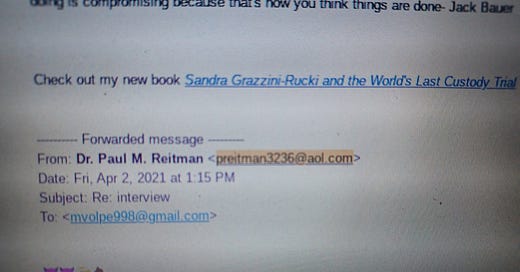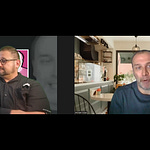(Audio in the podcast is from an attorney and a parental alienation expert named Fred Davis in a case in Mississippi)
In 2019, George Washington University Professor Joan Meier set the parental alienation world on fire when she released “Child Custody Outcomes in Cases Involving Parental Alienation and Abuse Allegation.”
That study is found here.
The conclusion of the study found that abusive people- primarily men- misuse parental alienation to counter abuse allegations.
The study stated,
Arguably the most troubling aspect of justice system response to intimate partner violence is custody courts' failure to protect children when mothers allege the father is abusive. Family courts' errors in assessing adult and child abuse, and punitive responses to abuse allegations, have been widely documented.
A significant contributor to these errors is the pseudo-scientific theory of parental alienation (PA). Originally termed parental alienation syndrome (PAS), the theory suggests that when mothers allege that a child is not safe with the father, they are doing so illegitimately, to alienate the child from the father. PA labeling often results in dismissal of women's and children's reports of abuse, and sometimes trumps even expert child abuse evaluations. PAS was explicitly based on negative stereotypes of mothers and has been widely discredited. However, the term parental alienation is still widely used in ways that are virtually identical to PAS. However, because PA is nominally gender neutral (and not called a scientific syndrome), it continues to have substantial credibility in court.
Parental alienation is a shadowy term with no one agreed upon definition- one of many problems I have with it.
That said, Dr. William Bernet defined it for me in 2018. It was part of an email in which he described the difference between parental alienation and alienating behaviors, but also noted parental alienation is rare.
Parental alienation (PA) refers to a mental condition in which a child, whose parents are engaged in a high-conflict divorce, allies strongly with one parent (the preferred parent or alienating parent) and refuses to have a relationship with the other parent (with rejected parent or alienated parent) without a good reason.
Alienating behaviors (ABs) are the acts of the preferred parent, such as indoctrination, which bring about PA in a child. ABs are very common and probably occur in most divorces to some extent; PA, on the other hand, is relatively unusual.
The problem found in Meier’s study was that the court system does a terrible job of identifying “real” parental alienation from that which is used as a tactic to cover up abuse.
This comparison shows that courts are significantly less likely to credit abuse claims when fathers invoke parental alienation. Among these cases, there is also an even greater drop in the crediting of child abuse than in the non-alienation cases: Rates of crediting of child abuse in this population are so low as to be approaching zero. In short, these correlations show that fathers’ alienation claims are remarkably effective in undermining (discrediting) mothers’ allegations of child abuse. When a father claims a mother is alienating the children from him, a mother’s abuse claim is 2.3 times less likely to be credited than when he doesn’t.
Given that parental alienation syndrome (“PAS”) was created specifically as a rationale for rejecting child sexual abuse claims, it is perhaps not surprising that alienation theory continues to be particularly powerful in application to precisely those cases. Current proponents of the concept of alienation, however, have asserted that it is different from PAS and should not be used in the same way. These data make clear that the operation of the theory in court has not changed: Neither courts nor professionals who inform the courts seem to have received that message.
I have recently released posts on two Orange County, California women- Donna McCracken and Christie Black- both of whom were falsely accused of parental alienation after raising abuse claims.
Meier’s study continued, “There were 163 cases in which mothers had physical possession of the children at the outset of the litigation and raised abuse claims in court, and fathers alleged mothers were alienating. Similar to the above data on the impact of alienation claims on courts’ rates of crediting of abuse, fathers’ alienation crossclaims significantly increase the rate of courts’ removals of custody from mothers. Mothers’ Custody Losses when Father Claims Alienation by Type of Abuse Alleged by Mother DV: 35% (20/57) CPA: 59% (10/17) CSA: 54% (19/35) DVCh: 58% (25/43) CACSA.”
With Meier’s study in hand a campaign has intensified to sully that term.
Proponents of parental alienation- this is a group which includes lawyers, therapists, psychologists, parents, and other activists- have been trying to discredit that study since.
In 2021, a study by Jennifer Harman and Demosthenes Lorandos entitled “Allegations of family violence in court: How parental alienation affects judicial outcomes.” attempted to do just that.
Regarding the Meier study, Harman noted on her academic page.
Prompting the new study was a 2019 assertion from a legal scholar who claimed that she and her team had found empirical evidence that claims of parental alienation were being used to ignore allegations of abuse, frequently putting the children into the care of potential abusers – and that it was also leading to women being more likely to lose custody. The researchers were also concerned that this new work was being cited frequently in arguments in the U.S. and abroad for policies and laws proposing to ignore parental alienation in child custody cases.
“That was alarming,” Harman said. What worried them even more was that the legal team’s report did not appear in a peer-reviewed research journal and lacked transparency as to their methodology and data, even when Harman’s team requested more information. “The more we dug into it, the worse it looked,” she said.
Harman teaches at Colorado State University. Lorandos is licensed forensic psychologist as well as an attorney.
Harman continued on her page.
Before they began data coding and analysis, Harman and Lorandos submitted their hypotheses and methods on Open Science Framework, an open web-based platform that supports research and collaboration. “We wanted to do it the right way and in a way that was transparent,” Harman said. “All of our data is up there, and anybody will be able to look at it.”
After having 19 research assistants, all blind to the study’s hypothesis, examine 967 appellate-level legal case reports where parental alienation was found or alleged to have occurred, “we didn’t find any support for what she’s claiming. In fact, we found the opposite,” Harman said. In other words, they found that parental alienation claims were not being used to override allegations of abuse.
The authors believe this is good news, and indicates that the systems to protect children have, in fact, been working well. They found, for example, that those who were engaged in alienating a child from another parent were given less parenting time. And, on the other side of the coin, if a parent alleged they were the victim of an alienation campaign, but their accusation wasn’t found by an expert to be credible, they weren’t more likely to get more parenting time.
This has set off an epic battle for control of the parental alienation narrative. Is it a phenomenon which affects millions of parents around the world, or is it a cynical tactic which is used primarily by abusive men to excuse their abuse?
I have written and spoken about this a lot.
I have spoken with hundreds of women and some men who reported abuse- physical, sexual or otherwise- who were then labeled by the court with parental alienation.
I have previously said, “Parental alienation is whatever you want it to be.”
The concept is poorly defined, with no agreed upon protocols.
It’s populated by quacks.
I once spoke to Fred Davis, who received a lot of appointments in Mississippi.
Only twenty five years prior to that conversation, he was developing real estate; that somehow went sideways and he somehow reinvented himself as a parental alienation expert.
He was involved in several controversial parental alienation cases. One found its way onto the internet.
On July 13, 2016 attorney Erich Jerscheid filed a federal complaint on behalf of Tim Stubbs and his sons, Ruslan and Elijah against Fred Davis, LPC (a/k/a) Fred G. Davis, Fred G. Davis, Sr., Upside Therapy, (a/k/a) Upside Down Family Therapy, LLC, Emily Suggs, Sheriff Bryan Bailey & Deputy/Investigator Raymond Duke, John Owen Recovery Consultations, Inc. and the Estate of Dan H. Fairly, Sr.
The 21 page complaint states that “Each Plaintiff was subject to unlawful search & seizure of their person and personal effects. One parent (Tim) lost custody for two months. Two non-English speaking teenagers were incarcerated without legal counsel or a translator. Both were ordered to counseling despite cultural differences, compelled to undergo counseling by a court-appointed individual who was not qualified to render the type of services for which he was appointed. A jury trial has been demanded.
I also released an audio into the podcast of Davis, from the same case, who had previously claimed to a client that he knew a horrible secret about his client but refused to release it it to the client’s lawyer.
After I interviewed Davis in 2018, he sent me this note.
Mike, as much as I enjoyed our conversations a week or so ago, and as exciting as it is to know an investigative reporter, I can’t pursue this any longer.
My thought was that investigative reporting focused first on investigating and then, depending on where the investigation led, reporting what was found.
In thinking about our conversations, I realize your reaching out to me had nothing to do with investigating; you had already decided that
1. I am a counselor who hurts children. And...
2. You believe I counseled children who did not understand what I was saying because they spoke another language.
I hoped you would have said, “I’m told you hurt children. What do you have to say to that?” That would have given me an opportunity to direct you to an eye witness or a medical report; both would dispute the accusation.
Since you were concerned about the need for a translator in another case, you could have asked if those sessions were recorded? Then you could have asked to listen to the recordings. Your source has them.
Mike, I appreciate your passion and hope that in another setting we could even collaborate in efforts to fight corruption. It seems that, for now, the truth has taken a back seat to agenda. Fred
In the Rucki case, the experts on parental alienation included Dr. Paul Reitman, who had previously been suspended.
He’s once told me, “Because the court hated her don't you know that of course I was court appointed by the judge and given a $100000 didn't know that."
In that case, Sandra Grazzini-Rucki was falsely accused of parental alienation after bringing forward a mountain of abuse against her including a CPS report which stated that dad, David Rucki, stuck a gun to his eight year old son’s head.
In another email to me, Reitman stated, “Role laughing hear that your cowardice your spineless you are a moron you are a sick person who deserves to die I'd love to do it....I want to tell you if you ever text me again I will find you and when I find you we will settle this stop texting me I mean it if you ever want to go on in life stop texting me....What's the matter Mr. Cop you won't mean the 1 on 1 boy I would love to meet you 1 on 1 and take it on you are a fool and a coward all your friends know that I've talked to your friends your ex Klopp's you slide back."
Once he sent me an email full of emojis. That’s below.
On the same case, and on Reitman’s recommendation, another so-called parental alienation expert was appointed named Jim Gilbertson. According to one of the daughters, Samantha Rucki, this guy during a court break began rubbing her shoulders until he got aroused. (from 3:10-4:52) below.
I exposed how Barbara Burkhart in Suffolk County, New York falsely labels parents with parental alienation. Here is that article.
Randy Rand, of Family Bridges, has been routinely exposed for all sorts of quackery like mandatory ninety day no contact between the alleged alienating parent and their children; he also has no current license and has a long list of aggrieved parents who have spoken out against him.
Donna McCracken had him for reunification, in 2019, I wrote a story which included this reference to him.
In the last eight months, Family Bridges has been the subject of three exposés by NBC Bay Area, NBC New York, and the Center for Investigative Reporting.
Collectively the three exposés found that all the kids interviewed were forced to be there, and that reunification therapy failed to heal their relationship with the targeted parent, often making things worse.
They also found that the psychologist who runs Family Bridges, Randy Rand, has an inactive medical license.
I recently did something on former baseball player David Segui’s, whose kids wound up in his reunification camp. Here is that article.
I also previously covered Dorcy Pruter, who does something like reunification even though she has nothing more than a high school diploma. Find that article here.
Reunification therapy is supposed to be a therapeutic intervention when the children find difficulty visiting with the noncustodial parent, but because she’s a high-school graduate, Pruter is not a therapist but a reunification coach- a term she created- and thus practices with little training.
She’s still considered an expert in the parental alienation industry; she was recently a featured speaker at the PAAO conference in April 2017. Her mentor, Dr. Craig Childress, was the other featured speaker at the conference. Childress has rebranded parental alienation pathogenic parenting.
According to Britt Brown, an activist for battered women, Dr. Childress current curriculum vitae has a gap from 1985-1998 where nothing is listed.
She said that because of Pruter’s lack of formal training, Dr. Childress often testifies in her cases as an expert on so-called pathogenic parenting.
“Then, he tells the judge the best place to get this treated is with Dorcy,” Brown said; he makes money from testifying, and she makes money from her so-called therapy.
With a collection of quacks and no standardization in the symptoms, how to identify them, how to treat them, or how to measure them, the field is left to its own devices.
With judges, lawyers, and these court appointees like Rand, Pruter, and Davis left to their own devices, and as such, in each case, they make up rules as they go along, allowed to do as they please.















Share this post